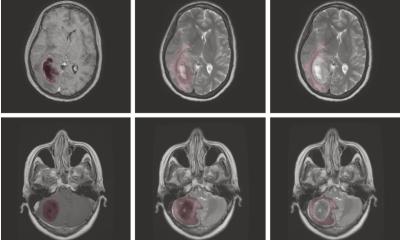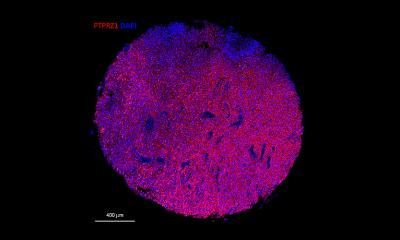
Image source: Wistar Institute
News • Astrocyte research
New insight into how cancer metastasizes to the brain
When cancer that starts in the body metastasizes to the brain, it is almost always lethal, in part because so few treatment options exist.
Now a new study by scientists at the Wistar Institute published in Nature Communications shows that a type of brain cell called astrocytes plays an important role in promoting brain metastasis by recruiting a specific subpopulation of immune cells.
The finding could be a first step toward identifying potential targets for therapies to fight cancers that metastasize to the brain. This would fill a significant unmet need, said researcher Qing Chen, M.D., Ph.D., assistant professor, Immunology, Microenvironment & Metastasis Program, Ellen and Ronald Caplan Cancer Center at The Wistar Institute. because treatment options for brain metastasis have lagged behind, even as advances in other cancer therapies have made enormous strides, making those cancers much more treatable. “It can be devastating for patients and their families, because they go through so much treatment, they survive the breast cancer, they all celebrate, and then it shows up in the brain,” leading to a terminal diagnosis, she said.
That shows the type I interferon response in astrocyte cells actually promotes metastasis
Qing Chen
Several types of cancer are known for metastasizing to the brain, including breast, lung, carcinoma, and melanoma. One reason conventional treatments do not work on these cancers after they reach the brain is because the brain is such a different environment from the rest of the body, with unique brain cells (neuron and glia cells) providing different support to the metastatic cancer cells.
For the study, researchers wanted to better understand the cancer-brain interactions that trigger metastasis when cancer cells enter the brain. They focused on astrocytes, a type of star-shaped cell that helps form connections between neurons. Using brain metastasis mouse models, researchers showed that when the astrocytes were exposed to cancer cells, they began to activate type I interferon pathways. Type I interferon, the cytokines associated with regulating inflammation, have been shown to have to anti-tumor effects. However, more and more evidence suggest controversial effects of type I IFN signaling in chronic inflammation and cancer. “That was an exciting surprise,” Chen said, adding that it was the first time the type I interferon response had been implicated to promote brain metastasis.
They found that the interferon response was being activated at a low level but for a prolonged period of time. This could explain why a process that is normally associated with helping the immune system was actually causing harm by supporting tumor growth. Previous studies have found that low-level, chronic interferon response can cause negative health outcomes, she noted. When they took a closer look, researchers found that the interferon signaling was activating production of a chemokine called CCL2, which in turn attracted harmful immune cells called monocytic myeloid cells. These cells promote tumor growth.
Researchers then studied mice that were genetically altered to abolish the type I interferon activation in astrocyte cells. They found that mice that were missing this pathway had fewer brain metastases. “That shows the type I interferon response in astrocyte cells actually promotes metastasis,” Chen said. She noted researchers found a similar result with both melanoma and breast cancer cells, showing that the process – and potential therapeutic targets – occur across different cancer types.
Chen hoped the findings encouraged more researchers to study the interactions that lead cancers to metastasize in the brain. “It’s an urgent need to have more people pay attention to this problem, and hopefully we’ll have more basic researchers and clinicians participate in future studies, as well as more resources,” she said.
Next, Chen’s team is applying for a federal grant from the National Cancer Institute (NCI) for a follow up study to better understand the mechanism and timing of how astrocytes and the interferon response promote brain metastasis, with a goal of identifying the best therapeutic window for treating and stopping this process.
Source: Wistar Institute
25.06.2023





